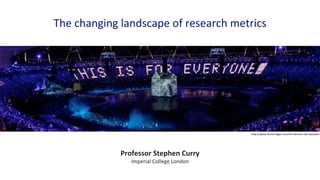The changing landscape of research metrics
- 1. The changing landscape of research metrics http://www.fameimages.com/tim-berners-lee-olympics Professor Stephen Curry Imperial College London
- 2. Measurement (and metrics) have their usesŌĆ” http://www.aronline.co.uk/blogs/news/news-uk-car-manufacturing-enjoys-bumper-2013/ https://www.nuh.com.sg/patients-and-visitors/patients-and-visitors-guide/choice-of-accomodation/ward-types.html
- 3. ŌĆ”but where are the limits?
- 4. Metrics and the academy http://www.ascb.org/dora/ http://www.nature.com/news/bibliometrics-the-leiden-manifesto-for-research-metrics-1.17351 Vale, R. D. (2012) Mol Biol Cell 23, 3285ŌĆō3289. Lawrence, P. A. (2007) Curr. Biol. 17, R583ŌĆō5. occamstypewriter.org/scurry
- 5. UK HEFCE Metrics Review 2014-15 Chair: James Wilsdon, University of Sussex. Funders Dr Liz Allen (Head of Evaluation, Wellcome Trust) Dr Ian Viney (Head of Evaluation, MRC) ŌĆō representing RCUK Dr Simon Kerridge (Director of Research Services, University of Kent) Dr Steven Hill (Head of Research Policy, HEFCE) Learned Societies Professor Richard Jones FRS ŌĆō representing the Royal Society Professor Roger Kain FBA ŌĆō representing the British Academy Publishers Sir Philip Campbell (Editor-in-Chief, Nature) Academics Dr Eleonora Belfiore (University of Warwick) Professor Stephen Curry (Imperial College London) Jane Tinkler (LSE; Parliamentary Office of Science & Technology) Bibliometricians Professor Mike Thelwall (University of Wolverhampton) Professor Paul Wouters (Uni of Leiden)
- 6. An open and robust process ŌĆó Broad terms of reference ŌĆó Open call for evidence, meetings & workshops ŌĆó Transparent: inputs & outputs published in real time ŌĆó In-depth review of the bibliometrics literature ŌĆó Quantitative correlation exercise relating REF outcomes to indicators of research http://www.hefce.ac.uk/pubs/rereports/Year/2015/metrictide/Title,104463,en.html
- 7. Main findings ŌĆó The description, production and consumption of ŌĆśmetricsŌĆÖ remains contested and open to misunderstanding. ŌĆó Peer review, despite its flaws and limitations, continues to command widespread support across disciplines. Metrics should support, not supplant expert judgement. ŌĆó Inappropriate indicators create perverse incentives, can be gamed, and may lead to unintended consequences. ŌĆó Metrics should be used responsibly: based on open data and used in a context-sensitive manner (e.g. with respect to disciplinary and researcher diversity)
- 8. Recommendations: Language The research community should develop a more sophisticated approach to the contribution and limitations of quantitative indicators. Indicators, not metrics?
- 9. Recommendations: Principles HE leaders and research funders should develop a clear statement of principles on their approach to research management and assessment, including the role of indicators.
- 10. Recommendations: Mindfulness Research managers, administrators, recruiters, promotion panels and researchers should all be mindful of the limitations of metrics/indicators
- 11. Recommendations: Transparency Data providers, producers of university rankings and publishers should strive for greater transparency ŌĆō acknowledge limitations and uncertainties, and provide access to the data. Research information should be open and trustworthy.
- 12. Gender issues ŌĆ”any system of assessment based on total citation numbers (such as an h-index) was likely to favour more established researchers ŌĆ”need to humanise the metrics debate (context is paramount) Consideration should be paid to the potential to change systemic and researcher behavioursŌĆ” For early-career researchers, metrics can shape the character of academic practice.
- 13. Trouble with good intentions: Pretty curious (EDF); ŌĆ£Science: itŌĆÖs a girl thing!ŌĆØ (EU) Trouble with girls ŌĆō and social media: ŌĆ£It was an unbelievably stupid thing to say. You can see why it could be taken as offensive if you didnŌĆÖt know TimŌĆ”ŌĆØ Trouble with perception: In 1990, 14% of crystallographers were female; some reckoned field to be ŌĆ£saturated with womenŌĆØ. Trouble with majorities: Men have to be involved in this issue, but dominant group lacks awareness of the perspective of womenŌĆÖs experiences FinallyŌĆ” some thoughts
Editor's Notes
- #4: Note that latest rankings exclude papers with >10 authors (QS) or >1000 authors (THE) - an example of the measurement distorting the system. Why do we submit to this?┬Ā
- #16: Not all the written evidence about the REF we received acknowledged the diversity of purposes of the REF, and there are clearly differences of opinion about the relative importance of the purposes. It is not surprising, therefore, that there are equally different views on how and whether quantitative indicators of research quality should feature in the assessment. This slide captures some of the overall points and concerns gathered through the process of evidence gathering














